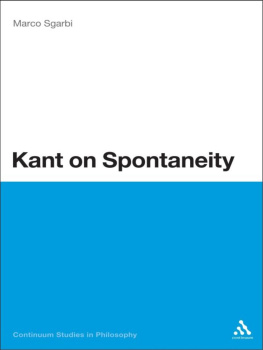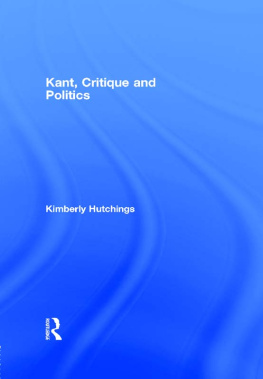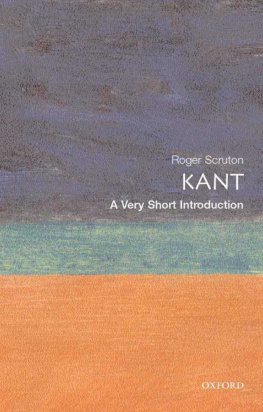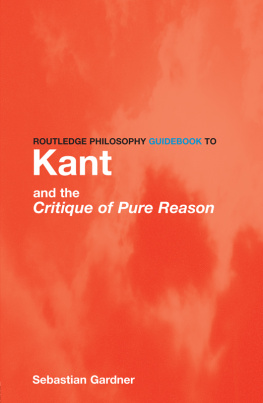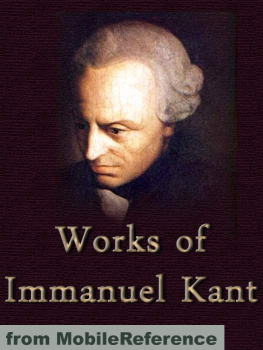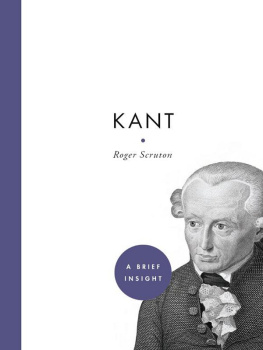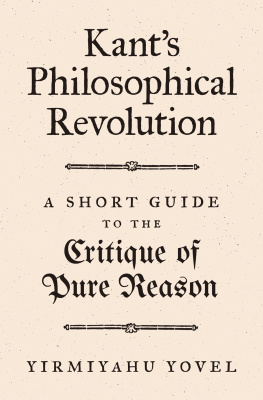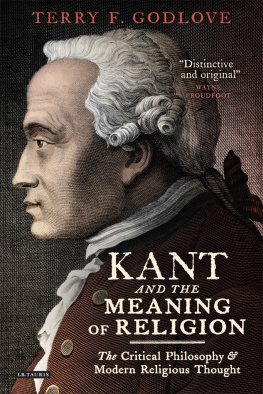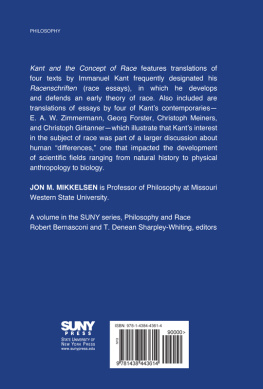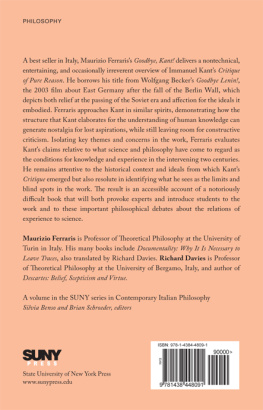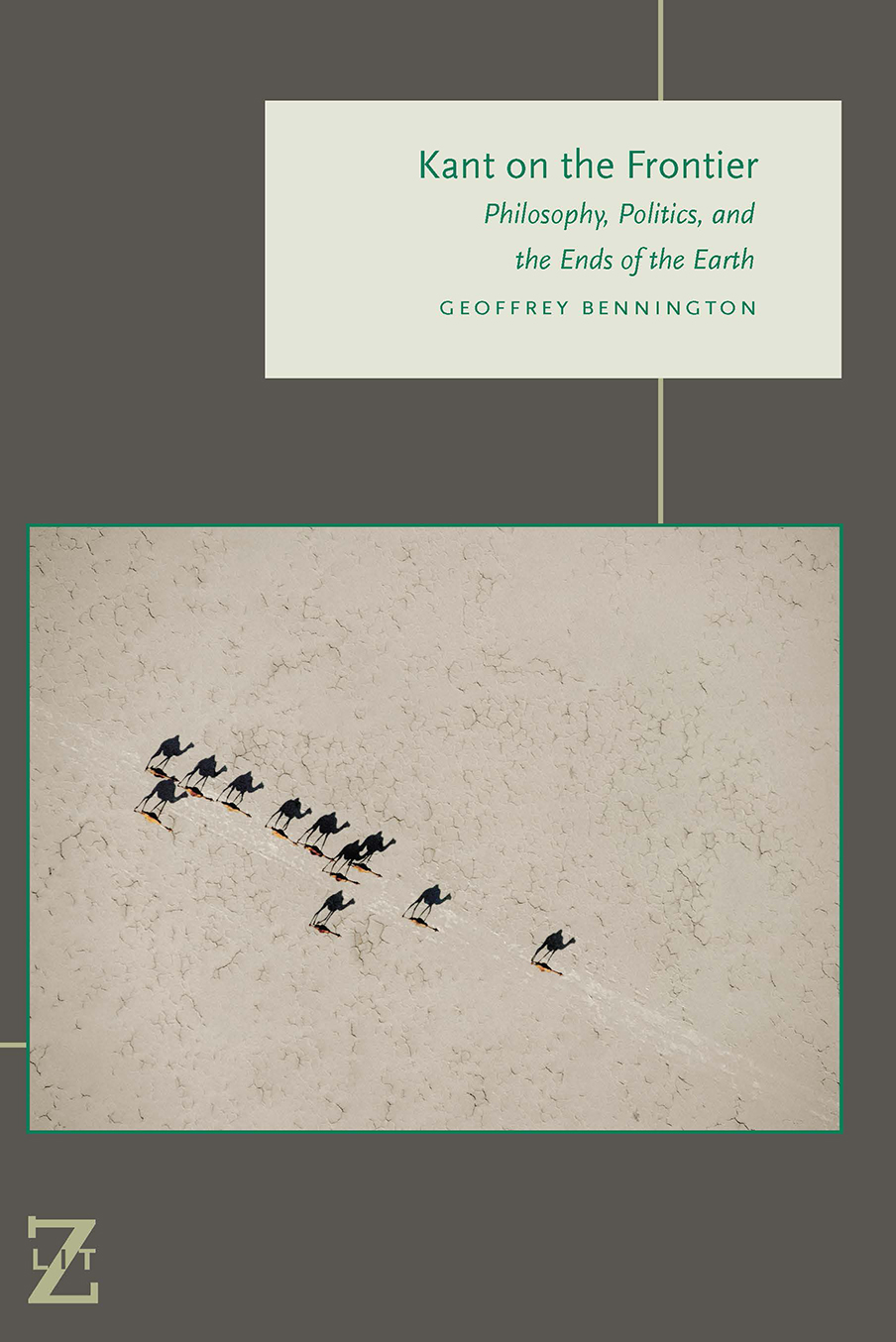Kant on the Frontier
Kant on the Frontier
Philosophy, Politics, and the Ends of the Earth
Geoffrey Bennington
Fordham University Press
New York 2017
Copyright 2017 Fordham University Press
All rights reserved. No part of this publication may be reproduced, stored in a retrieval system, or transmitted in any form or by any meanselectronic, mechanical, photocopy, recording, or any otherexcept for brief quotations in printed reviews, without the prior permission of the publisher.
This book was originally published in French as Geoffrey Bennington, Frontires kantiennes , Copyright ditions Galile, 2000.
Fordham University Press has no responsibility for the persistence or accuracy of URLs for external or third-party Internet websites referred to in this publication and does not guarantee that any content on such websites is, or will remain, accurate or appropriate.
Fordham University Press also publishes its books in a variety of electronic formats. Some content that appears in print may not be available in electronic books.
Visit us online at www.fordhampress.com .
Library of Congress Cataloging-in-Publication Data available online at http://catalog.loc.gov .
Printed in the United States of America
19 18 17 5 4 3 2 1
First edition
Contents
Preface to the English Edition
This book is the outcome of a long and quite involved history. Its distant origins lie in a graduate seminar I conducted at the University of Sussex from 1989 to 1992, as one of the Collge international de philosophies first group of corresponding program directors. That Sussex seminar, conducted in English under the general title Frontiers, met once a week for three academic years, focusing on Kant (198990), Hegel (199091), and Frege and Wittgenstein (199192). I took the opportunity to present a seminar in something more like the French sense, writing out a continuous text that I read to the group every two weeks, with intervening weeks devoted to student presentations and more informal reading and discussion sessions, sometimes of other authors (Kafkas Great Wall of China and The Burrow gave us food for thought, for example). The seminars bear a number of traces of their historical moment, including the fall of the Berlin Wall (I was especially struck by the fact that the first reported piece of graffiti on the East German side of the wall read the wall is gone) and a subsequent flurry of enthusiasm in the press for Kants political writings, taken more or less navely to predict the European Union eventually formed in 1993, and seen, by some at least, as representing some kind of end of history.
Starting again from the Kant material, I wrote in 1995 the continuous draft of what subsequently became Frontires kantiennes (Galile, 2000). The book starts from the seminar material on Kant (and some of the Cerisy Frege material), elaborates it considerably in the detail and depth of the readings, and departs from it most saliently in the long treatment of the Critique of Teleological Judgment in chapter 5. The present volume is a somewhat adapted translation of that French book: it still follows the French text closely, and maintains some of the French philosophy features of the writing, but I have taken many liberties in the interests of readability that I would not take translating the text of another author. I have also removed a number of remarks that bore specifically on the often inaccurate published French translations of Kant and taken the opportunity to correct a few errors of my own, to clarify the argument here and there and to delete a handful of more speculative remarks (often in footnotes) that no longer seem justified to me. A few longer footnotes have been incorporated into the body of the text. I have also included as an Appendix an essay originally written in French for a conference, also in 1995, focusing directly on Kants use of the terms Grenze and Schranke and their cognates in his many discussions of frontier questions.
Many fine books and articles on Kant have of course been published in several languages since this book was first published. Given its focus, however, and its quasi-narrative (quasi-teleological) movement toward the still not widely read Critique of Teleological Judgment, I have not tried to update it with reference to recent scholarship. My current understanding of some of the issues addressed here has certainly benefitted from more recent reading of excellent and important books by, among others, Peter Fenves, Olivia Custer, Peter Szendy, and Catherine Malabou, all of which deal to some extent with salient issues addressed here, and with all of whom there would also be differences to explore; but direct engagement with them here would have introduced an awkward element of anachronism into the book and interrupted the continuity of the argument. Nor have I tried to address the influential recent anti-Kantianism associated with the new realism, which I believe to be largely misguided in its aims and inaccurate in much of its understanding of Kant, and to which I hope to respond elsewhere.

The stakes of the argument presented here essentially revolve around a claim about the interrupted or self-interrupting structure of teleological schemas, a claim that can be summed up in the slogan the end is the end: the end in the sense of goal or telos is also the end in the sense of finis , or death. Kant, or so I argue, provides textual resources for thinking through the difficult consequences of this thought (which I believe is one possible way of understanding Derridas still enigmatic slogan la diffrance infinie est finie). I try to develop this claim first on the basis of Kants writings on history and politics, subsequently in his explicit thinking about teleology, but also, throughout, on the persistent analogies he mobilizes between these two apparently separate parts of his philosophy, and indeed on the explicit discussion of analogy itself. I do not think that the structures that emerge from these readings can adequately be thought in terms of the Idea in the Kantian sense, at least as usually interpreted (nor a fortiori in terms of the Idea in the Platonic sense). The claimed interruption or disruption of teleological schemas that the end is the end tries to capture has immediate consequences for how we think about history and politics, but also (in another persistent analogy) how we think about reading , and perhaps more especially the reading of philosophical works. And thereby how we think about thinking itself (especially if it be accepted that the concept of concept is teleological and therefore interrupted too, as suggested here in the brief polemical reading of Frege). I believe that philosophy most often tends to repress the question of reading and that reintroducing that question has philosophical effects that exceed the reach of hermeneutics (philosophys bestbut inadequateeffort at a theory of reading) and are most clearly and productively thought through in deconstruction. The apparently analogical communication between the political implications of this interrupted structure of teleology on the one hand, and its implications for reading and doing philosophy more generally on the other, cannot satisfactorily be left in the hands of the concept of analogy, however, unless we push very hard at what Kant himself identifies as the point of heterogeneity that really is the point of analogy and that might justify the introduction of a notion of ananalogy to describe it. This point of heterogeneity, which is what we are interested in but cannot quite understand in an analogy, is what exposes critique in the Kantian sense to deconstructive reading and, given the continued prevalence of Kantian schemas in moral and political thinking at least, seems to promise the possibility of reformulating habitual ways of addressing such issues, including the predominantly historicist ways that currentlyand I believe unfortunatelydominate academic work in the humanities.



